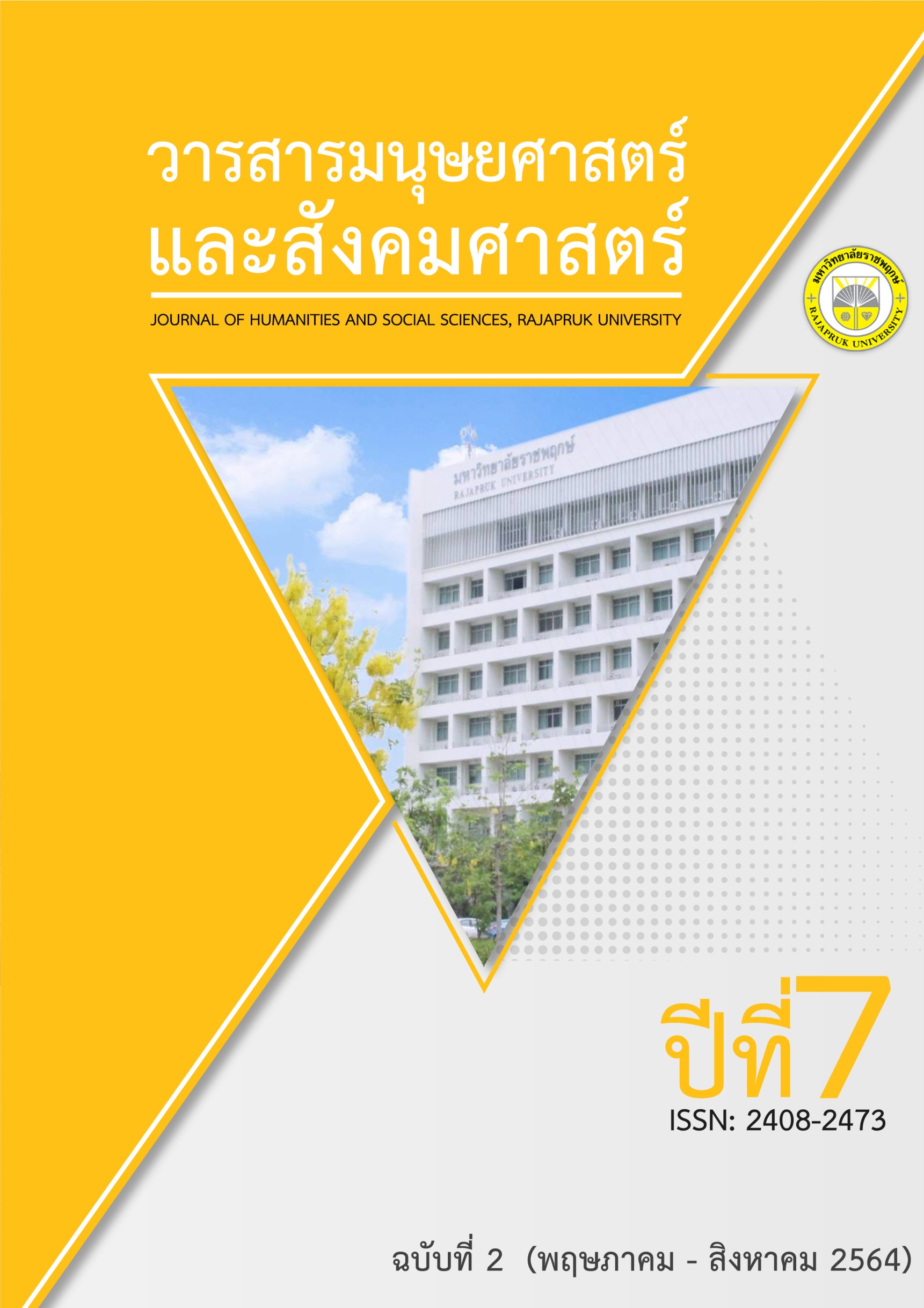The Learning Organization in the Digital Era According to the Opinions of Personnel under Vocational Education in Pathumthani Province
Main Article Content
Abstract
This research aimed to study and compare the learning organization in the digital era according to the opinions of personnel under vocational education in Pathumthani province classified by gender, age, education level, position and work experience and to study the guidelines for promoting the learning organization in the digital era according to the opinions of experts. Sample group was personnel under vocational education in Pathumthani province of 195 samples using stratified random sampling and 5 experts. The instruments used questionnaires and interviewing form. The statistics used percentage, mean, standard deviation, t-test, One-Way ANOVA, LSD and content analysis. The results of the research were as follows:
1) the learning organization in the digital era according to the opinions of personnel under vocational education in Pathumthani province in the overall were at a high level (mean=3.98, SD=0.26), the highest mean was learning technology (mean=4.36, SD=0.40), the lower others were knowledge creation and transfer, quality, appropriate structure, shared vision, teamwork and networking, corporate learning culture, supportive atmosphere, environment scanning, strategy and empowerment 2) the comparison of the learning organization in the digital era classified by gender were not statistical significantly, except classified by age, education level, position and work experience were statistical significantly at .05 level. and 3) guidelines to promote the learning organization in the digital era according to the opinions of experts were administrators should be promote the using information technology, the internet system should be fast, organize learning should exchange activities, should create work motivation establishing vision and strategies in line with current technology changes.
Article Details
References
จุฑาพร บุญวรรณ. (2553). การพัฒนารูปแบบความเป็นองค์กรแห่งการเรียนรู้ในวิทยาลัยเทคนิค. วิทยานิพนธ์ปริญญาการศึกษาดุษฎีบัณฑิต มหาวิทยาลัยมหาสารคาม.
นฤมล จันทร์สุข. (2556). รูปแบบและกลยุทธ์การพัฒนาการเป็นองค์กรแห่งการเรียนรู้ของวิทยาลัยพยาบาล. วิทยานิพนธ์ครุศาสตรดุษฎีบัณฑิต จุฬาลงกรณ์มหาวิทยาลัย.
นุช อนิวรรตน์. (2551). การศึกษาสภาพที่เป็นจริงและสภาพที่คาดหวังของการพัฒนาองค์กรไปสู่องค์กรแห่งการเรียนรู้ สํานักบริการทางวิชาการและทดสอบประเมินผล (สวป.) มหาวิทยาลัยรามคําแหง. วิทยานิพนธ์ปริญญาศึกษาศาสตรมหาบัณฑิต มหาวิทยาลัยรามคําแหง.
ประยูร อิ่มสวาสดิ์. (2552). ลักษณะความเป็นองค์การแห่งการเรียนรู้ของมหาวิทยาลัยบูรพา. ปริญญานิพนธ์การศึกษาดุษฎีบัณฑิต มหาวิทยาลัยศรีนครินทรวิโรฒ.
ปราณี ตันประยูร. (2560). ความเป็นองค์กรแห่งการเรียนรู้ของมหาวิทยาลัยราชภัฏพระนครศรีอยุธยา. วารสารวไลยอลงกรณ์ปริทัศน์ (มนุษยศาสตร์และสังคมศาสตร์), 7(2), 35-44.
พนานันท์ โกศินานนท์. (2551). แนวทางการพัฒนาวิทยาลัยราชพฤกษ์สู่การเป็นองค์กรแห่งการเรียนรู้. รายงานการวิจัย มหาวิทยาลัยราชพฤกษ์.
ภัทรวดี ศรีนวล และ สถาพร ถาวรอธิวาสน์. (2554). ความคิดเห็นต่อการเป็นองค์กรแห่งการเรียนรู้ของวิทยาลัยพยาบาลบรมราชชนนีชัยนาท และวิทยาลัยพยาบาลบรมราชชนนี สวรรค์ประชารักษ์ นครสวรรค์. วารสารวิจัยทางวิทยาศาสตร์สุขภาพ, 5(1): 17-24.
ภัสราภรณ์ อยู่มาก และ โชติมา แก้วกอง. (2560). ปัจจัยที่มีผลต่อการเป็นองค์กรแห่งการเรียนรู้ของมหาวิทยาลัยศิลปากร วิทยาเขตพระราชวังสนามจันทร์. วิทยานิพนธ์ศิลปศาสตร มหาบัณฑิต มหาวิทยาลัยเกษตรศาสตร์.
สำนักงานคณะกรรมการการอาชีวศึกษา. (2560). แผนพัฒนาการอาชีวศึกษา พ.ศ.2560-2579. กรุงเทพฯ: สำนักงานคณะกรรมการการอาชีวศึกษา.
สำนักงานคณะกรรมการการอาชีวศึกษา. (2561). มาตรฐานการอาชีวศึกษา พ.ศ.2561. กรุงเทพฯ: สำนักงานคณะกรรมการการอาชีวศึกษา.
สำนักงานอาชีวศึกษาจังหวัดปทุมธานี. (2561). แผนยุทธศาสตร์พัฒนาสถานศึกษา. รายงานการประชุมจัดทำแผนยุทธศาสตร์พัฒนาสถานศึกษา. ปทุมธานี: วิทยาลัยเทคนิคปทุมธานี.
อภิชชยา บุญเจริญ. (2556). อิทธิพลของวัฒนธรรมองค์กรต่อการเป็นองค์กรแห่งการเรียนรู้. สารนิพนธ์ปริญญาบริหารธุรกิจมหาบัณฑิต มหาวิทยาลัยศรีนครินทรวิโรฒ.
อารยา บวรพาณิชย์. (2553). ความคิดเห็นของบุคลากรมหาวิทยาลัยเทคโนโลยีสุรนารีเกี่ยวกับปัจจัยที่มีผลต่อการเป็นองค์กรแห่งการเรียนรู้ของมหาวิทยาลัยเทคโนโลยีสุรนารี. วิทยานิพนธ์ปริญญาบริหารธุรกิจมหาบัณฑิต มหาวิทยาลัยสุโขทัยธรรมาธิราช.
Kaiser, S. M. (2000). Mapping the Learning Organization: Exploring A Model of Organizational Learning. Dissertation for the Degree of Doctor of Philosophy, Louisiana State University.
Krejcie, R. V. & Morgan, D. W. (1970). Determining Sample Size for Research Activities. Educational and Psychological Measurement, 30(3): 607-610.
Marquardt, M. J. & Reynolds, A. (1994). The global learning organization. New York: Irwin.


